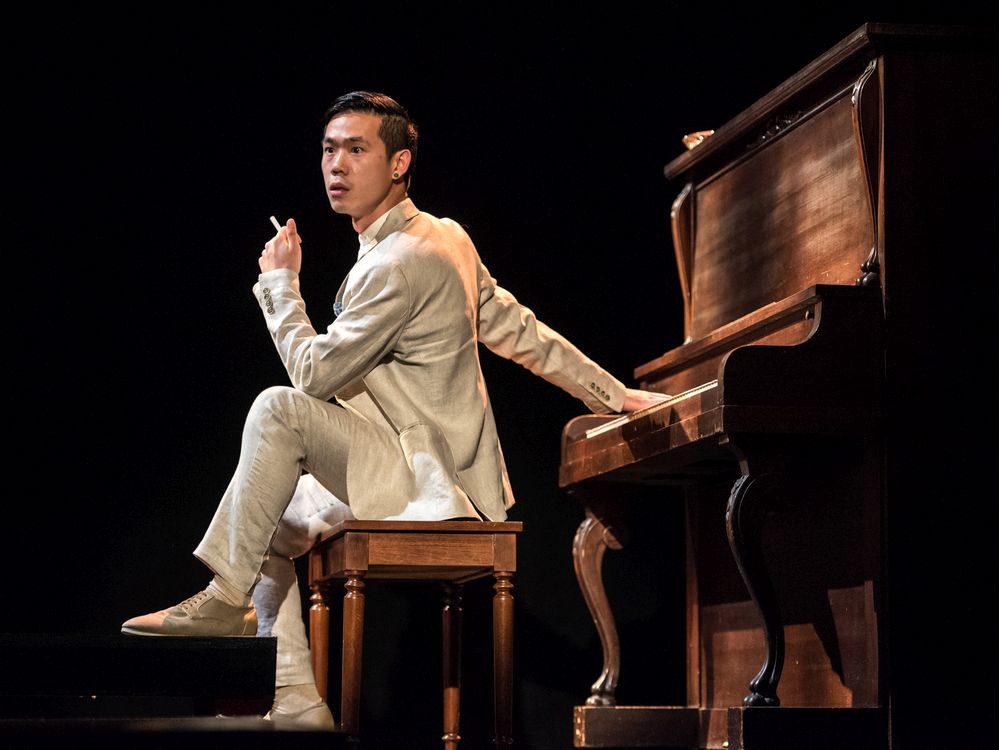Trace: Powerful Potrayal of Duty, Sacrifice and Strength through the Keys of a Piano

Written by Kennedy Fiorella, in Yana Meerzon’s theatre criticism class at the U of Ottawa
The story of familial sacrifice is one that runs through Canadian identity. In Jeff Ho’s Trace, he masterfully “traces” his family history through the three generations of women who came before him. As he physically embodies the characters of his mother, grandmother, and great-grandmother, Ho reveals not only his own family secrets, but completely immerses his audience through the music of their pasts. Through expert direction and captivating acting, Factory Theatre’s production of Trace at the National Arts Centre delivers a powerful evening of emotionally harrowing experiences which gives new life to Ho’s ancestors with every note played.
Trace begins with Ho’s great-grandmother, an expert mahjong player who fled China for Hong Kong in WWII, greeting his mother, Annie, as she arrives back in Hong Kong after leaving years before to start a “better life” in Canada. His grandmother, who married into the family after her family was killed in WWII, has lived all of her adult life in the same house as her mother-in-law, and holds great resentment for that. All three of the women are single mothers in some capacity: Ho’s great-grandmother lost her husband to the Japanese in WWII, his grandmother’s husband lies in a hospital bed, and his mother left her husband due to his “flighty” ways. This singular encounter, of Annie returning home to speak to her mother and grandmother after many years abroad, allows for each of the women to recount and replay earlier moments in their lives. Divided by piano “movements”, these stories are woven together by Ho, alternating perspectives of an experience in an instant, reclaiming the power of his ancestors. Trace asks not only the women portrayed onstage, but the audience as well, what are you willing to do to survive?
Directed by Nina Lee Aquino, Trace’s story grounds itself in the realistic portrayals of
Ho’s mother, grandmother, and great-grandmother, and this is the most important aspect of the performance. As Trace is a one-man show, the sole objects on the stage are Ho himself, and two pianos facing each other, on either side of the Azrieli Studio floor. In the play, Ho moves between the two pianos, and plays to represent the voices of the men in his family member’s lives, again allowing the voices of his female ancestors to hold the utmost importance. As he attacks the piano with rigor, he draws the audience into a trance-like wonder, which he breaks through abrupt bursts of energy and swift character changes. Lighting, designed by Michelle Ramsay, scatters boxes of lights across the stage, like mahjong tiles across the playing table. Each box of light represents another moment in the women’s lives.
Ho masterfully embodies the lives of the women, repeatedly and flawlessly switching back and forth between rapid Cantonese and English as if he is flicking through radio waves. Each woman is identified through changes in physical stature, voice, and indicators. Ho’s great-grandmother almost always has a cigarette, and as she says, a cigarette reminds her of everyone she’s ever shared one with. Ho’s grandmother holds an embroidered handkerchief, given to her by her husband, one of Ho’s great-grandmother’s sons. Ho’s mother carries her physical self with perfect posture, and a calm voice, needed as she makes the difficult journey of immigration. Each woman has their own unique experiences within their own lives and in their oftentimes difficult relationships with their children.
Ho’s play expertly overlaps the stories of his mother, grandmother, and great-grandmother through each other’s, offering a sense of deja-vu as stories repeat from the perspectives of each woman. The music of the piano is interlaced through each developing moment, drawing in the audience even deeper into the women’s experiences. As their powerful story of sacrifice and intergenerational trauma plays out, the audience is able to truly see what the idea of “intergenerational duty” to family means. Ho’s female ancestors are brought to life onstage, and they ask, what are mothers willing to do for their children? The answer is, anything.
Trace
Written by Jeff Ho
A Factory Theatre Production presented with NAC English Theatre
November 12th – 23rd, 2019 at the National Arts Centre
Playwright, Composition, Performance Jeff Ho
Direction Nina Lee Aquino
Stage Management Andrea Baggs
Production Dramaturg Matt McGeachy
Set Design Nina Lee Aquino, Michelle Ramsay
Lighting Design Michelle Ramsay
Costume Design Joanna Yu
Wardrobe Chanti Laliberte